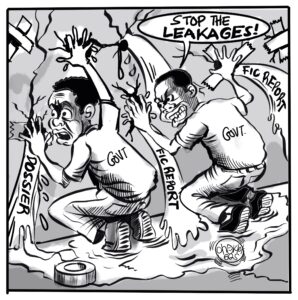ECONOMIST Professor Oliver Saasa says Zambia still needs a debt management plan to help guide the path towards an International Monetary Fund (IMF) economic programme.
In an interview, Prof Saasa said the presence of the debt management plan would provide comfort to the IMF as government continued its talks with the Fund.
He said Zambia’s lack of a debt restructuring plan undermined the country’s ability to address its ongoing fiscal challenges and meeting the objectives of the recently-launched Economic Recovery Programme (ERP).
“So, the challenge is that if there isn’t or if it’s too slow, then it will give us discomfort, especially now that we are discussing with the IMF because the IMF are also particularly interested in seeing the debt issue you saw is one of the things that they have highlighted. They are still discussing the background after the conclusion on the 3rd of its consultation this month. So, it’s the debt, and they are interested as much as the bondholders were interested in seeing the debt management strategy, debt dismantling strategy, the IMF also are talking about the same. So, it’s not only actually in the interest of these external actors where they are talking about the multilaterals like the IMF and the World Bank, but also the bondholders, it must be of interest to Zambians because, really, ultimately, especially in the context of the Economic Recovery Programme, it has to be something that helps navigate round the challenges, but also meeting the objectives as outlined in what I consider to be a good document,” Prof Saasa said.
He observed that government had twice defaulted on debt interest repayments despite requesting for a six-month moratorium.
“Now we are getting to the end of the moratorium period that we requested and we have defaulted twice and the other default is just around the corner, essentially meaning that they didn’t give us a moratorium, we defaulted. But even after this period that we wanted a break, whether we paid or not, it’s no longer relevant in my view. If we paid, fine, they were going to be happy, if we didn’t pay, we wanted the time assuming that during this period we have been developing what they wanted in the first place. But it appears that even that which we wanted in the first place has not come out. That we wanted a moratorium to develop something, they didn’t give it to us, but, of course, we had the time, we haven’t even been punished for defaulting. So, have we been developing this (debt management plan) and when is it coming out?” Prof Saasa wondered.
He noted that it was important for Zambia to finalise the strategy before requesting for a moratorium rather than formulating a plan during the moratorium period.
“My position was that you need to sell the product and demonstrate that we need the moratorium because ‘this is what we are working and we are finalising,’ rather than saying, ‘give us the moratorium and then during that time of moratorium is when we will think through what we want to do’,” he said.
He cautioned that if the debt management plan was not produced to clearly spell out how government planned on addressing the debt, bondholders would be vindicated on not wanting to grant government’s application for a moratorium.
“My take is, I assume that the government is working on something, I have no idea because they are not talking to that detail and that in no time, probably by the end of the six-month moratorium period, which the Honourable Minister of Finance (Dr Bwalya Ng’andu) requested we are going to see and this is in a couple of weeks’ time, we are going to have something that will come out. Now, if it won’t come out then, of course, it will be like a self-fulfilling prophecy, the bondholder will say, ‘you see, we told you these people were not ready that’s why we were apprehensive’, we don’t want it to go to that level,” Prof Saasa said.
And Prof Saasa wondered why the formulation of the debt restructuring plan was being secretly formulated without consultation from the private sector.
“So, the challenge for me is with the Ministry of Finance: how far are we, is it a secret document? I would have thought it’s something that must have been open, must have involved a number of people, including some of us, why not the private sector where we could have provided some input? I was expecting that, really, it was going to be a national document and that we don’t only expect the Ministry of Finance to do it, but also the Ministry of Finance to facilitate and get a number of people, professionals on board to help government. If that is happening, I am not in the loop, I am not part of it so pardon my ignorance, I am not aware of the process of that nature,” he said.
“The strategy which we want or which everybody is waiting to hear, including the bondholders is key, because it will allow all interested parties, including the externals, to see that we are serious about our commitment against which we actually requested for the moratorium.”
He added that while the lack of a debt management strategy may not impact the sought-after IMF programme, publishing it would provide comfort to the IMF.
“I am not privy to the details of what’s happening, I get bits and pieces sometimes from the press, sometimes from insiders that I talk with regarding how far we have gone. What I hear is that there is some positive progress, some positive traction, but also what I heard through the statement of the IMF is that there are a few vexing issues where clarity is required and that is in the public domain. What it means is that until we know how far the discussions have gone beyond the 3rd of March when it was concluded, that is at the more direct level, they said they needed a couple of weeks, that was the statement. It’s already a couple of weeks. My hope is that to the extent that the issue of debt and debt management, debt restructuring, the approach that we want to use, we are talking about just a strategy and it’s a strategy that the IMF would also want to come in and help to the extent that is still pending. I am not saying that the IMF won’t give you (the bailout package) because that is pending, but what I know is that it will bring a lot of comfort, significant levels of comfort to the IMF when this comes out and it will help the level of discussions,” said Prof Saasa.



















